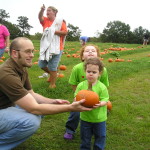The Responsorial Psalm for today is Psalm 1 as you might have gathered from my previous post. In reading through Psalm 1 in the New American Bible (=NAB), I felt like it obscured the progression to be found in verse 1, so I took a look at the verse in parallels. It turns out that a number of other translations handle the verse in a way similar to the NAB, whereas two others do not.
Psalm 1.1 in the NAB
Blessed the man who follows not
the counsel of the wicked
Nor go in the way of sinners,
nor sits in the company of the insolent,
The verbs in question in this verse are those translated as “follows,” “go,” and “sits” in the NAB. In this translation, the first two verbs are treated as near synonyms. But, let’s see how these verbs are handled by other versions.
Psalm 1.1 in Parallel Versions
 Parallel Versions Viewed in BibleWorks 8
Parallel Versions Viewed in BibleWorks 8
Here are how the verbs are handled:
New American Bible – “follow,” “go,” “sit”
New American Standard – “walk,” “stand,” “sit”
New Revised Standard – “follow,” “take (the path – these words are not part of verb),” “sit”
Today’s New International – “walk,” “stand,” “sit”
New Jewish Publication Society – “follow,” “take (the path),” “join”
The translation issue revolves primarily around the second verb. In the NAB, NRSV, and NJPS, the second verb is translated as a near synonym of the first “follow-go/take (the path)”. In the NASB and TNIV, it is translated as “stand.” It would seem that the translations that treat the second verb as a near synonym of the first are trying to deal with the presence of the word “path” as in “take the path.” “Stand” does not really capture the type of movement associated with a path, though “stand” is the most common translation of the word.
So, does one nuance the word more commonly translated as “stand” in order to capture the motion of the path? I do not think that is necessary or helpful here because I believe it obscures the increase of engagement, which John Hobbins calls a crescendo. Maintaining the translation “stand” the progression is then “walk,” “stand,” and “sit.” As one moves through these verbs, one gets a greater sense of lingering. I don’t think this progression is captured as well when the first two verbs are translated as near synonyms. So, I would translate the second verb as stand while realizing why others would prefer a verb that captures the motion of the path.
Related – Check out some of my other Psalms posts from this week:
Psalm 103 & Prosperity Thought
Psalm 98 & Assonance




